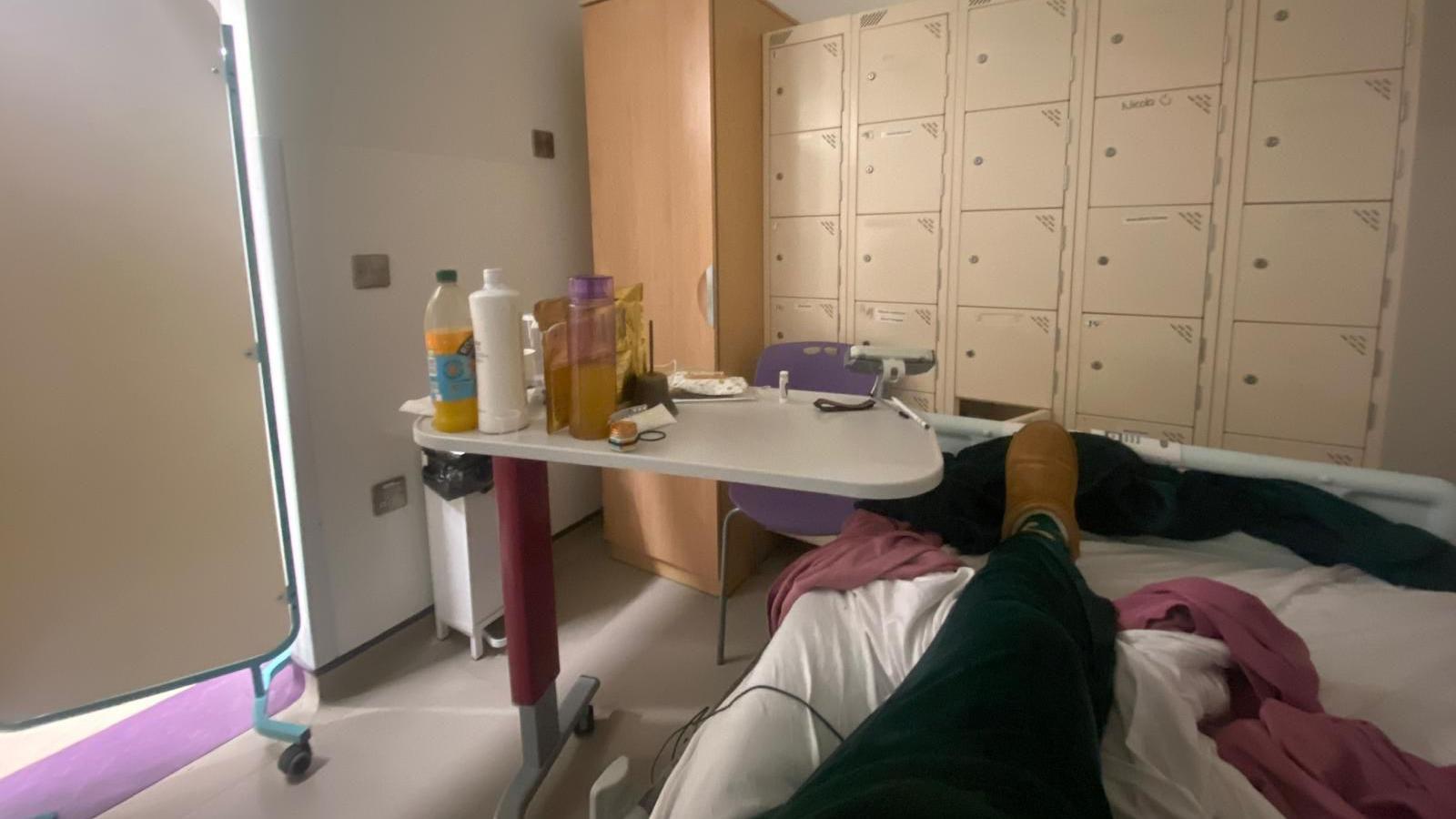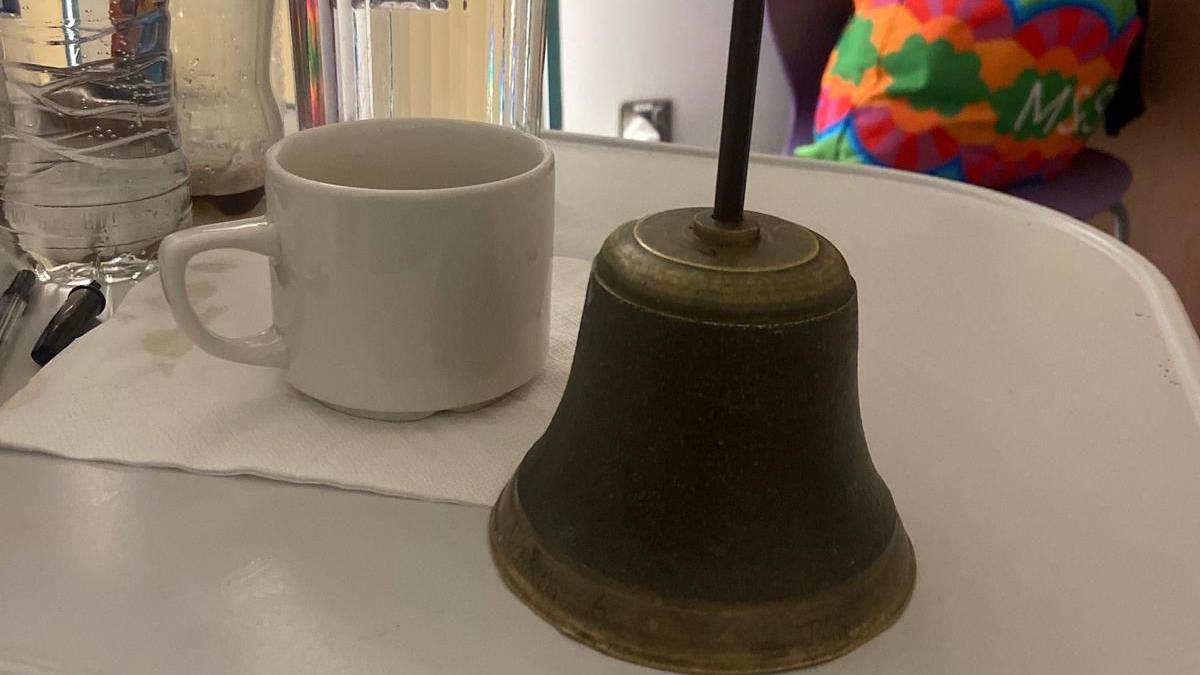Hospital patient spent nine days in locker room
Zoe Carlin was admitted to Altnagelvin Hospital in Londonderry after experiencing severe chest pain.
- Published
A woman who feared she was having a heart attack said she spent nine days in a hospital staff room because of a shortage of beds.
Zoe Carlin, 23, was admitted to Altnagelvin Hospital in Londonderry in March after experiencing severe chest pain.
She said she spent more than a week in a locker room where she had to use a hand bell to call staff during what she described as a “dehumanising” ordeal.
The Western Health and Social Care Trust (WHSCT) said it faced "extreme pressures" in its hospital emergency departments but could not comment on individual cases due to confidentiality.
The Department of Health said it was "concerned" at the story and would carry out a review into Ms Carlin's case.
“For the full nine days I was in this alcove,” Ms Carlin told BBC Radio Foyle’s North West Today programme.
“It’s basically the nurses' locker room. You can see the nurses’ lockers with their names on them. They [staff] just said there’s not enough beds,” she added.
A privacy screen, she added, did not fully cover the room’s doorway and she had no access to a private bathroom.
She said she was forgotten about at meal times on three occasions.

Ms Carlin said her entire hospital experience was "dehumanising"
Ms Carlin has been on a waiting list to see a heart specialist since early 2024.
She presented to Altnagelvin’s emergency department (ED) on 26 March after experiencing chest pains at home.
She was taken to the ward after a 29-hour wait in the ED, where she said, she fainted twice.
“I was sitting there saying to people: ‘I feel like I am having a heart attack, I am 23, there’s a history in my family of people having heart attacks in their twenties and I’m really scared’ and they are like ‘OK, we’ll put you in an alcove’,” she said.
She was, on the night of her admission, one of three people referred to as “alcove patients”, she said.
'Dehumanising'
With her heart rate elevated and because she was feeling faint, Ms Carlin said she was advised to call staff when she needed the bathroom.
“I’m not joking, they gave me like a school bell, I needed to ring this really embarrassing bell," she said.
"I’m sure it was dehumanising for the nurses, too, to have this massive bell rang in their faces."
Ms Carlin said nursing and medical staff were trying their best in very difficult circumstances, but that she only saw a doctor twice during her admission.
The Easter holidays might have compounded staff shortages and a reliance on agency staff, she said.

Zoe was given a bell to call nursing staff when she needed to go to the bathroom
“The nurses were trying their hardest, at the end of the day I was an extra patient on their ward,” she said.
When discharged, she said, a member of the medical staff told her because she had presented with a condition not easy to diagnose, she would be better “going back to your own GP”.
Ms Carlin had an echocardiogram before her discharge but her condition remains undiagnosed.
She said she now didn't know what to do.
“I have to go to my own GP, fight my own corner and I am exhausted. I have a heart condition making me exhausted, I am in pain every single day, I am so tired, and being told I have to be the one who pushes to get a diagnosis.
“There is nobody fighting for me, nobody in my corner,” she said.
Paying for private care, she added, was not an affordable option.
“It is just really scary. All the waiting lists I know take so long. I was referred to cardiology in January, I have never met them, I was in hospital and never met them, so how am I supposed to believe I am going to meet them this year?” she said.
Department of Health response
The Department of Health said it was "acutely aware of the pressures" in emergency departments.
However, it said, "at all times, patients should be treated with dignity and care".
"We are concerned at Ms Carlin’s account of how her experience fell short of these standards.
"We will be carrying out a review of her case, with the Western Health and Social Care Trust, and seeking urgent clarity on the next steps in her care."
The WHSCT said the concerns had been shared with the relevant clinical teams and it could not comment on individual patients due for confidentiality reasons.
A spokesperson said they would encourage anyone with a complaint to contact its patients' advocate office on (028) 7161 1226 and all complaints received are "investigated promptly".
"We are acutely aware of the continuing challenges and extreme pressures not just in our emergency departments but across both of our acute hospital sites with full escalation of beds on all wards and departments," the spokesperson added.
"In the Western Trust, when we learn of examples where care falls below the standard we expect, we review the circumstances and explore ways to improve care in the future."